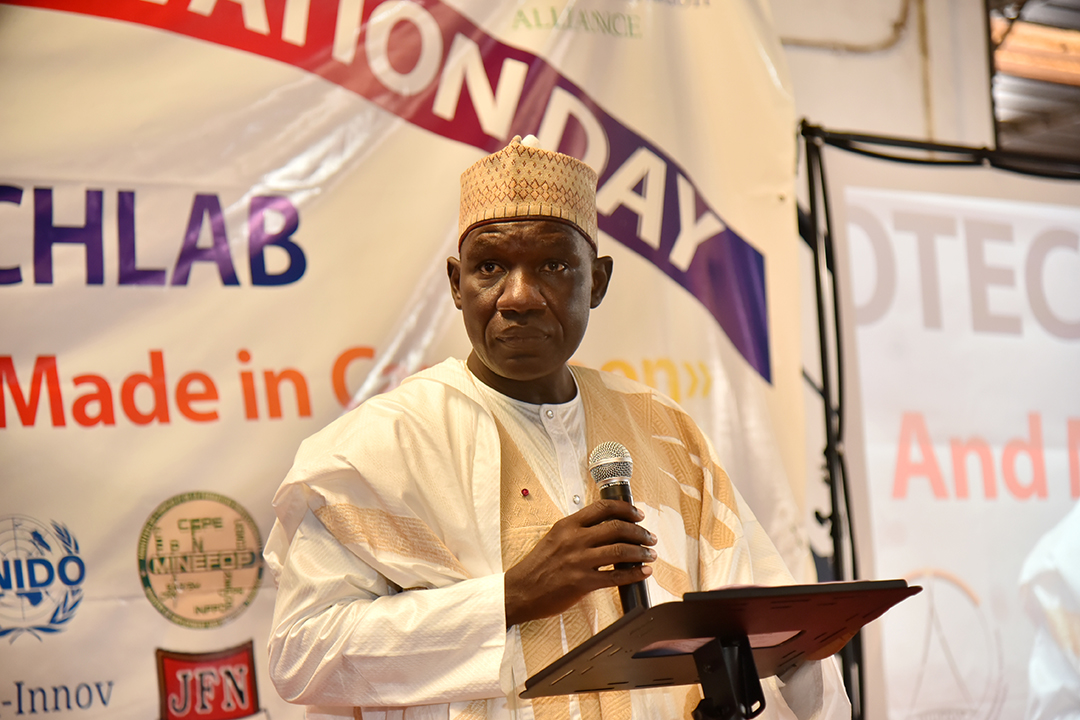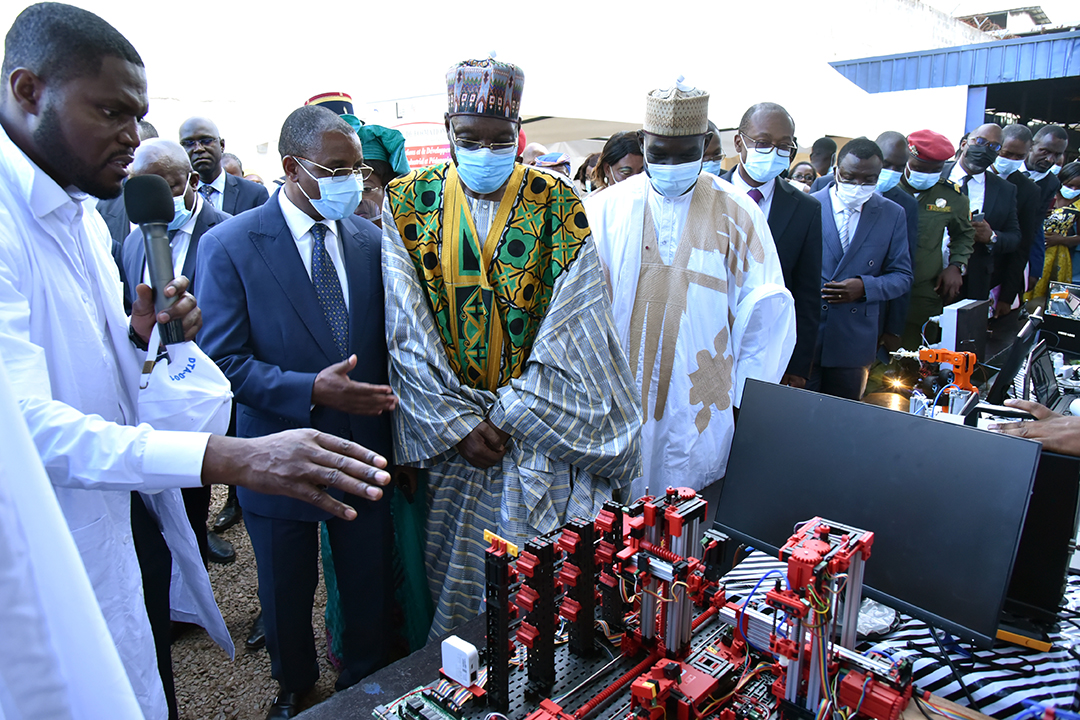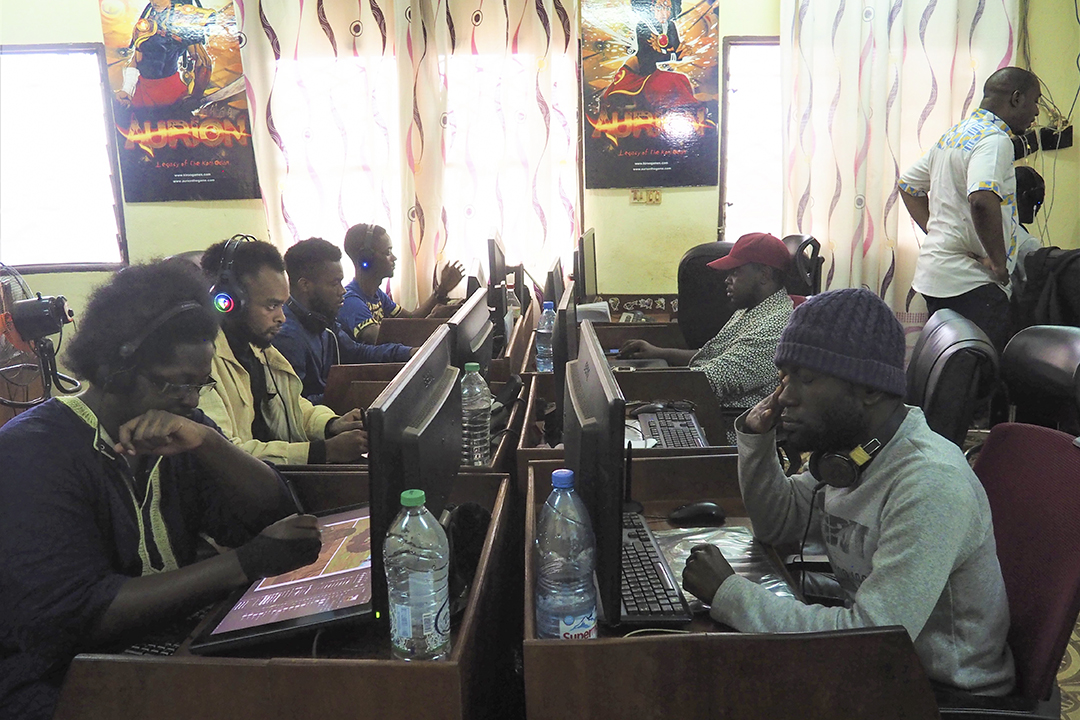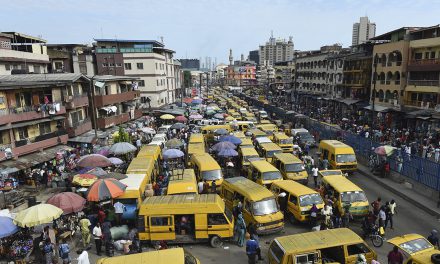In Cameroon, many people are dissatisfied with the budgetary allocations to different administrative regions and sectors. Under President Paul Biya, 89, who has uninterruptedly ruled Cameroon for close to 40 years, there has been glaring disregard for the use of data – even often unreliable – in decision making.

Alamine Ousmane, Cameroon’s Economy Minister, attends Technology Innovation Day in Yaounde, Cameroon on 7 October 2021. Photo: Jean Pierre Kepseu/Anadolu Agency via AFP
Every year, the government allocates a public investment budget to each of its 10 administrative regions for specific infrastructure projects. In principle, this allocation is supposed to be equitable based on data such as population size. But in practice, available data is hardly considered in decision making.
A case in point is Cameroon’s public investment budget (PIB) for 2017. Based on the 2008 population census, the south (Biya’s home region) had some 761,000 people, while the English-speaking south-west and north-west regions had 1.4 million and 1.7 million people respectively. Despite these numbers, however, the 2017 PIB budget allocated more than double the amount for projects in the south than the south-west and north-west combined.
According to the government project logbook for 2017, the south was allocated more than 570 projects at 126 billion francs CFA. The north-west region got some 500 projects at 42 billion francs CFA, while the south-west region was accorded more than 500 projects at 43 billion francs CFA. This has been a pattern in successive years, highlighting lapses in governance and leading to the manifestation of dissent like the one which gave birth to the drawn-out, bloody Anglophone crisis.
Cameroon, like other sub-Saharan African countries, has a problem with the production of reliable data. The situation is so precarious that Shantayanan Devarajan, the one-time chief economist for Africa at the World Bank, described it as “Africa’s statistical tragedy”.

Issa Tchiroma Bakary (C), Cameroon Minister of Communication and Alamine Ousmane (4th L), Economy Minister of Cameroon and Minister of Posts, attend Technology Innovation Day in Yaounde, Cameroon on 7 October 2021. Photo by Jean Pierre Kepseu/Anadolu Agency via AFP
On the Statistical Capacity Indicator (SCI) produced by the World Bank, which measures the statistical strength of countries across three categories – methodology, source data and periodicity – Cameroon scores low. In 2020, the country had an overall score of 46.7, way below the sub-Saharan Africa average of 57.1.
The last time Cameroon had a general population and housing census – its third since independence in 1960 – was in 2005. The results were only published years later. The total population of Cameroon back then was enumerated at 17,463,836. Global standard recommends that such census be conducted at least every 10 years. But 17 years later, Cameroon has yet to conduct another census. So, it is unsurprising that the government does not have a reliable estimate of the number of people living in the country at present. A census is important in that it bears essential information, including spatial distribution, age, sex and other key social economic characteristics – all key data for government planning.
Cameroon does have a National Institute of Statistics (NIS), established in 2001, to produce timely data on key economic matrices such as GDP growth rate, industrial producer price index, commercial sales, inflation, the trade deficit, Gini coefficient, the employment rate, poverty and literacy rates. But data is not produced timeously and accessibility remains a problem.
Bama Etienne Cham, a trade policy advisor, and UN consultant, told Africa in Fact that there is limited data available to support policy decisions in Cameroon.
“The outcome of some government decisions raises so many questions as to the approach used in achieving the results,” he said. “The availability of data is one thing, and the use of data is another. Those in decision-making positions, designing policies, should ensure that these are supported by data. It is evident that some use little data while others don’t use it at all. The outcome is visible,” said Cham, who sees source and reliability as the major challenges.
Cameroon has weak technical and human capacity to support the collection, treatment and dissemination of statistical data, and this is aggravated by the lack of financial resources for the long-term training of statistical staff and to fund frequent surveys and census.
These challenges are compounded by the presence of multiple actors charged with the production of data. In Cameroon, the players include the NIS, the Central Bureau of Census and Population Studies, the National Civil Status Registration Office, the Ministry of Finance, and the Ministry of Public Health, amongst others. Data is also often fragmented; the same type of survey is conducted using different methods.
But according to Ndi Nancy Saiboh, the executive director of Actions for Development and Empowerment (ADE), in addition to structural barriers, the underlying cause of the gaps in the production of reliable data and the use of it in planning is politics. This, she says, hinders the capacity and incentive of government to produce statistical data. “Like everyone else, governments and their development partners need good data on basic development metrics. To be of value, such data must be accurate, timely, disaggregated and widely available. This is not the case in Cameroon.”

The workroom of Kiro’o Games in Yaounde, the first video game studio in Cameroon. Photo: Adrien Marotte/AFP
As the leader of a civil society organisation that works to hold government accountable for its service-delivery obligations, she strongly believes that the absence of reliable data in Cameroon and the use of it in decision making is responsible for governance lapses in the country.
“Reliable data is essential for national government and institutions to accurately plan, fund and evaluate development activities. Basic development indicators are essential for an accurate picture of a country’s development status. This includes a country’s progress towards specific development goals and improving its citizens’ socioeconomic conditions,” Saiboh said.
She pointed out that Covid-19 had exposed countless governance lapses in Cameroon – from the lack of a central data base to obsolete health facilities.
Chiraz Bensemmane, the founder of Pitch World Fast, a business development consultancy, shares similar thoughts with Saiboh.
“Data collected during Covid-19 has shown the key role [it plays] in supporting healthcare systems, and the key role of locally produced, reliable data in ensuring the sovereignty of each authority,” Bensemmane told Africa in Fact. She added that while data does not guarantee the implementation of better policies or practices, its absence often leads to problems or failure.
“African authorities increasingly need to make use of data, whether through technological tools or large-scale surveys and assessments with the right systems in place for systematic collection, analysis and interpretation of multiple data sources, which will help them build trust within their population in their decisions, policies and reforms,” she said.
Cameroon opposition leader Prince Ekosso, the national president of the United Socialist Democratic Party (USDP), thinks that the government, with its top-down management approach, is not serious about data. He believes that although the government does collect information from its decentralised regional or departmental services, it hardly uses it in planning. “This has a negative effect on governance,” Ekosso said, adding that this kind of planning increased the social tension among increasingly exasperated citizens.
Given the status quo, it is therefore unsurprising that people like Saiboh see Cameroon as a country where little useful social research on critical issues is done. “In the absence of reliable data, we just keep expressing our subjective opinions on almost everything under the sun,” she said.
[activecampaign form=1]
Amindeh Blaise Atabong is a Cameroonian freelance journalist. His interests include gender, human rights, climate change, environment, tech, conflict, peace-building and global development. In 2019, he was a finalist in the inaugural True Story Award, and also won a prestigious Kurt Schork Award in International Journalism. His works have been published by independent regional and international outlets, including Quartz, Mail & Guardian, Reuters, Jeune Afrique, Epoch Times, African Arguments and Equal Times.












